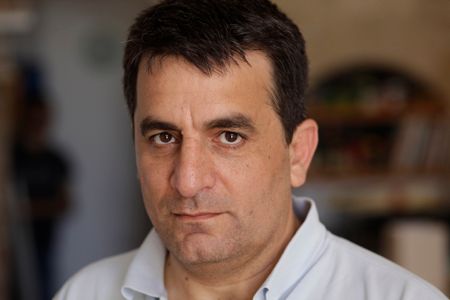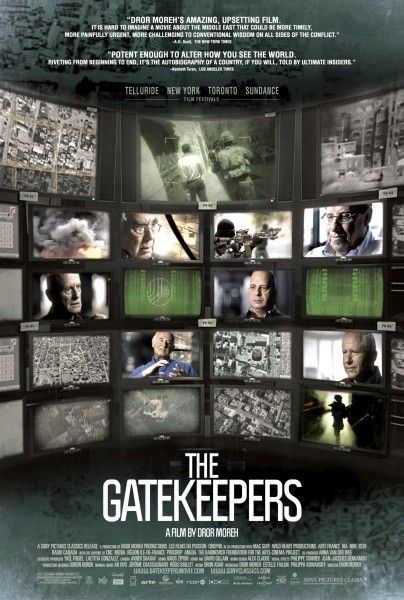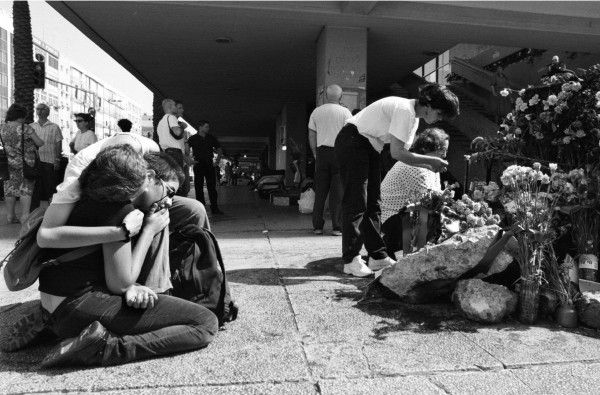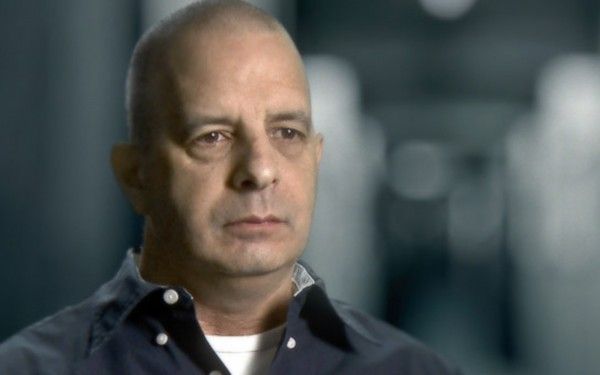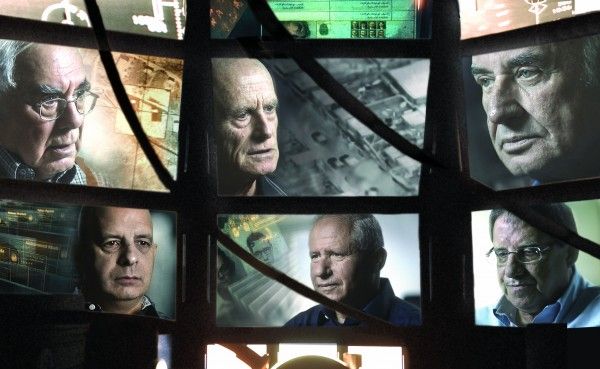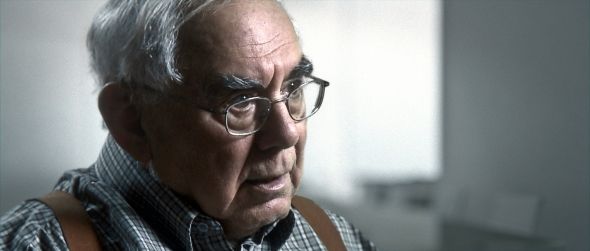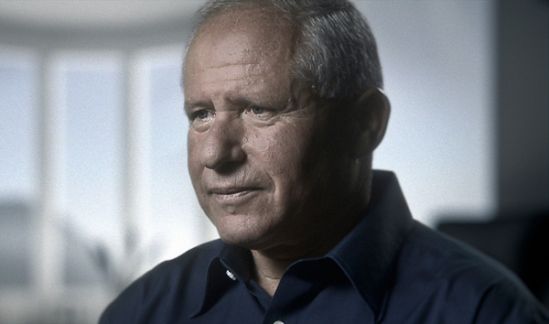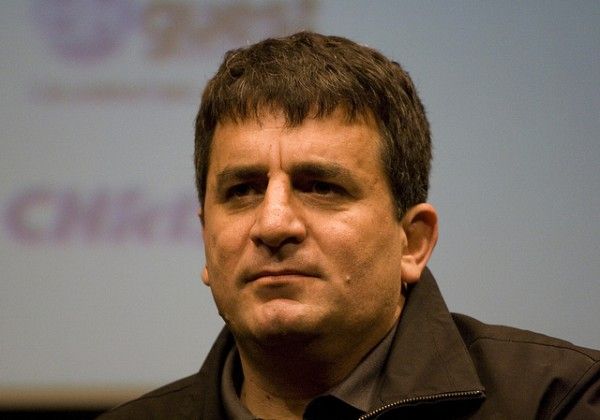Charged with overseeing Israel’s war on terror – both Palestinian and Jewish – the head of the Shin Bet, Israel’s secret service, is present at the crossroad of every decision made. For the first time ever, six former heads of the agency agree to share their insights and reflect publicly on their actions and decisions. The Gatekeepers, which was recently nominated for an Academy Award for Best Documentary, offers an exclusive account of the sum of their successes and failures. It validates the reasons that each man individually and the six as a group came to reconsider their hard-line positions and advocate a conciliatory approach toward their enemies based on a two-state solution.
At the film’s recent press day, director Dror Moreh sat down with me to talk about what inspired him to make the film, how he was able to gain unprecedented access and convince the former heads of Shin Bet to talk candidly about their professional work and personal views, and how he shaped thousands of hours of filmed interviews, re-creations and archival footage into a 97-minute film. He also discussed what he learned personally from making the film, the overwhelmingly positive reaction The Gatekeepers has received since it opened in Israel, the film’s Oscar nomination, and his upcoming dramatic project. Hit the jump to read more:
Question: You began your film career as a cinematographer. What was it about cinematography that appealed to you and what inspired you to want to become a director and a documentary filmmaker?
Dror Moreh: I’m very attached to the visual aspect of film. I’m a big fan of fiction film where you have a story and you have to transform that into a visual language, basically working with actors and also transforming that into how you pronounce that in the visual language of the shots, the construction of the shots and the lighting. All of that appealed to me from the beginning of my career at the university. When I graduated from the university, I wanted to deal mainly with that, with the visual aspect of the movie. When you live in Israel, there are restrictions which come from budget definitely. I came to the point where I had shot many fiction, many feature films, but at one point it began to bore me. It was boring because when you’re Gordon Willis or when you are a legend of American cinematography -- I can cite a lot of names of a lot of people that I was looking up to -- you know that you are gradually building yourself and you can go into bigger budgets and experiment more. In Israel, the budgets are very, very limited. I felt that I was touching a glass ceiling. This is why one day I decided to move towards documentaries or to move to more directing in documentaries at this point in my career. Why documentaries? I also love fiction. I would love to direct a fiction movie as well. But I think where I come from, reality is so interesting and has in it so many good stories to tell, this is why I’m doing that. I’m enjoying that.
Your film takes an intriguing look at the inner workings of the Israeli government and their national security apparatus. Can you talk about what drew you to this project?
Moreh: First of all, I like espionage stories. I like secret service. I like those kinds of stories. I’m really an addict for that, for all those kinds of secret agent stories and intelligence gathering. All the time it drew me. Also, there was one movie that was a real source of inspiration. It’s The Fog of War by Errol Morris. I remember the first time I saw that movie it blew me away completely, because for the first time in my career, I saw someone who was in the most intimate circle of power who spoke firsthand about how a decision was made in those rooms in which we wish we could be a fly on the wall. First of all, he describes the human beings that have been making those decisions and the frailty of those human beings and how sometimes big mistakes could have been avoided if only people would have been more thorough and understood much more. So I said I have to try to create something which is at that magnitude about the Israeli-Palestinian conflict, from people who have been in the most intimate rooms of power circles and speaking about how and why a decision has been made from intimate knowledge, not from someone who analyzed that from far away, but from someone who has been there who can testify firsthand to those moments, to those issues. This is why I started this movie.
Why did you want to do a documentary about the Shin Bet?
Moreh: Because the Shin Bet, this is his raison d’etre. This is what he does. This is the intelligence organization that deals with the Palestinian. His day to day life is dealing with the Palestinian terror and understanding the Palestinian and understanding the Jewish extremism. If you had a broken leg, you wouldn't go to a pediatrician or an optician. You would go to an orthopedic surgeon. So, if you want to know about the Israeli-Palestinian conflict, you had better go to the people who are most [experienced]. This is what they do. These are the experts for the Israeli-Palestinian conflict. You go to the expert to tell you why and what happened.
What is it about the imperfections, the shortcomings, the frustrations, or the vulnerability of people in positions of power that appeals to you?
Moreh: It’s not that I knew I would encounter those kinds of qualities before I started the film. It’s not that I knew that from the beginning. But I would say, one of the most interesting parts for me was to find those kinds of fallibilities and imperfections and human issues inside them and to discuss it with them. I’m a person who really likes to understand motives – the inner motives and the inner personalities of those persons. Why do people do those things? How do they deal with themselves while doing that? Definitely one of the most interesting parts of doing those interviews and creating the movie was going into those persona issues in each one of them. Each of them paid a dear price for what he did. Some of them are more aware of that and some are less aware, but definitely all of them have paid a dear price. This is what I tried to do, to show the price that they have paid, from their point of view, for maintaining the security of Israel.
You were given unprecedented access. How were you able to convince the six former heads of the Shin Bet to allow you to interview them – something that’s never been done before?
Moreh: I simply asked. I knew that I wanted to create something that all of them would be in, because I knew that if I only took one or two, the corridors of power would not like that and they would dismiss that as a leftist, dissatisfied person, mentally disturbed, or something like that. I wanted the corridors of power and the public to deal with all six of them. There are no living heads of Shin Bet who are not in the movie. All of them are in the movie. So go and deal with that. This is what I wanted. Go and tell this group they don’t understand what they’re talking about, or that they don’t like Israel, or that they are frustrated. They are motivated from the six. I think that this resonated. I agreed that it was good to do that because it resonated with the reaction that I got. You cannot dismiss them lightly. You cannot dismiss what they say easily. All of them are saying this.
Was it difficult to get them to talk about their professional work and to share their personal views?
Moreh: It was difficult mainly when it came to operating the secrets of the trade. When we started to talk about how they do that and their methods, which they felt were endangering the work of the Shin Bet, they were more reluctant to speak. They cannot talk about it. I understand completely. It’s like you’re coming to George Tenet, let’s say, the head of the CIA, and you ask him how did you do this? How did you find out about him? Or you ask Leon Panetta how did you find bin Laden? Well, there is a movie now about it. But [they could not] go into the operation of real things. I love this kind of espionage stuff and I learned a lot about the work of an intelligence officer. How do you gather intelligence? How do you work in a hostile environment? How do you do a targeted assassination? I tried to understand. The Americans are doing that a lot in Afghanistan. But how does someone on the ground send in drones and know that this terrorist is moving in this car at that time and know exactly where they are at a certain point in time. There are a lot of things going on there.
How did you put them at ease and get them to open up and have a frank discussion?
Moreh: It’s a long conversation. What you’re doing with me here in the 15 minutes which they allow you, I did in long interviews of hours and hours at the beginning. And then, it’s a conversation between two human beings that are interested in one another. I am definitely interesting in what they have to say. I’m interested in their personality and in their motivation, so it’s a completely open conversation. This is what I try to achieve when I’m speaking to them. At the end of the day, it’s a conversation between two humans. Whenever you are interviewing someone, he looks at you and he sees you. You have to be relaxed. It is a human connection between two persons every time that you do an interview. And believe me, I interviewed Condaleesa Rice and Joschka Fischer. I did a lot. You have to be yourself and trust yourself.
You had many hours of filmed interviews as well as scene re-creations and archival footage that you used. Can you talk about the challenge of editing all of that into a 97-minute film? What was that process like and how did you decide what to include and what not?
Moreh: I had 60 to 70 hours of interviews with them. I had more than a thousand hours of archive footage without the re-creations. It was a huge amount of work. This was the most painful part in the making of the film because of what was left out. It was the most painful thing. The editing process lasted for almost three years with the CGI and all the research for the archive footage. It’s a long, long process which was very painful. But, at the end of the day, the process is shaping. It’s like a craft. All the time you are shaping and shaping, and whatever is there is important and more important, so we had to reach a length that would be good enough for presenting in the cinema. I couldn’t believe it. If you’d asked me after the second year, I would have said, “The movie will be 2-1/2 hours. I cannot go down from that.” Slowly, slowly shaping it, this is what happened. That is the process.
One thing that impressed me was how candid and critical they are about the Israeli-Palestinian conflict, its impact on Israeli society, and the politicians and successive governments they’ve worked with. Their collective perspective seems to be that dialogue with Israel is essential and that peace is achievable. Did any of that surprise you?
Moreh: No, but I’m much more bleak than them. I’m much darker than them. They always say to me, “You are too depressed. You have to be more optimistic because leadership can change everything.” But, the fact of the matter is that I don’t see really good leadership on the horizon of Israel that can take those decisions needed to be taken in order to reach peace. Having said that, I have to tell you that I don’t believe it’s [any different] with the Palestinians. It’s the same way. I feel that there is the same lack of leadership on both sides, although I feel that the Palestinians, certainly the ones in the West Bank now, Salam Fayyad and Abu Mazen, are much more pro-peace or much more proactive than the Israeli government. But I don’t really believe that something like that can be achieved. If you ask me to sum up what I feel after this movie, in terms of the territories, I think Israel has reached the point of no return and this is very, very sad.
Has your film been seen in Israel yet?
Moreh: Yes, it opened two weeks ago in Israel.
What was the reaction?
Moreh: Amazing. Unbelievable. It opened in two theaters because it’s a documentary. In Israel, no one goes to documentaries in cinemas. We are now in nine major cinemas. The screenings are completely sold out a week ahead. The media’s endorsement is amazing and definitely what has happened in the U.S. and the huge endorsement that the film has gotten in the U.S. in festivals, critics-wise and everything, and the nomination for the Oscar. That’s fantastic for the film in Israel.
How do you feel about your film being nominated for an Academy Award for Best Documentary?
Moreh: When I was told that the film was nominated, I jumped. The ceiling stopped me from going any further. Look, it’s the dream of every filmmaker to be nominated. It’s the most prestigious honor in our industry definitely for everybody. So, I am honored, and I am hopeful, and I am thankful for that.
What did you learn personally from making this film?
Moreh: That’s a tough question. I learned a lot, but I think the major thing that I learned is how the leadership in Israel could have done much more in order to solve this problem and didn’t. Things could have been much better, much earlier had there been the courage that was needed in the Israeli and also the Palestinian. I’m speaking mostly about the Israeli because I’m an Israeli and I’m not putting the blame on the Palestinians. I’ve said that a lot today, but Abba Eban (Israeli politician and diplomat) said once, “The Palestinian never missed an opportunity to miss an opportunity.” And I think that it goes for both sides. I think the Israelis and the Palestinians have never missed an opportunity to miss an opportunity. Today, we are in the direst, gravest situation ever, unless Obama, from my point of view, will put the pressure that America can put if she wants to do that on both sides and will force them with a carrot big enough as the Four Season Hotel on one side and a fist with iron big enough as the Four Season Hotel on the other side of the equation. Otherwise, nothing will happen. I don’t think that the Israelis and the Palestinians have in themselves now the capability to reach an agreement between themselves unless the international community will put the force and the measures to force those two sides. I don’t think that within themselves they can solve it. I think the international community should come and say, “This is the solution. If you take it, you get a carrot yea big. If you don’t take it, you will be beaten with a fist yea big.” This is the only way that something might happen on the ground besides that.
What was the most enjoyable part of making this film and was there a part that you could have lived without?
Moreh: All of it. I enjoyed very much doing that film, although there was a lot of debate. I learned a lot during the editing and also the CGI and the re-creation of those drone views. The re-creation based on real photos was something that I enjoyed inventing as a language for this film. I think it was the first time that something like that has been done in a documentary film ever, so it was walking on a new turf. As a person, I like to walk in the danger zone. It was for me very, very interesting. I enjoyed every part of making the film – the music, all of it. I don’t think that there was a part that I could have done without. I had to go through all that.
What are you working on next?
Moreh: A fiction film which I’m developing right now. It will be about security issues, the same issues. I’ll have actors, all of that. I love that world as well very much.
Do you have a cast in mind?
Moreh: It depends where I will do it, if I do it here or if I do it in Israel. They are different worlds. I wish to do it here.
The Gatekeepers opens in limited release this weekend.

